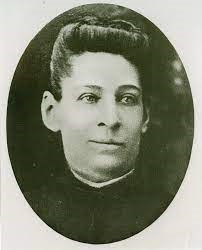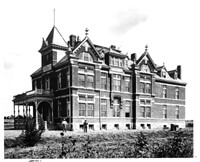Our History
Denver in the 1880s was a boomtown as the Gateway to mining towns throughout the Rockies people flocked here from around the country to seek their fortune but another less visible group came to Denver as well consumptives is seeking a cure in the Colorado sunshine and clean mountain air for their wasting disease came to the city some the fortunate few who could afford treatment when sunshine and fresh air failed them found some peace in resorts like Manitou Springs others more often ended up on the city streets penniless homeless and without hope in response to the crisis a few pioneering individuals led by Francis Weiss Bart Jacobs the wife of a wealthy merchant made it their mission to build a facility that would cater to the poorest consumptives who would otherwise be without care together the group led by Jacobs raised funds to build a hospital dedicated to the care of indigent TB patients at the hospital groundbreaking rabbi William Friedman shared the vision for this facility as payne knows no Creed so this building the grand idea of Judaism which is cast aside no stranger no matter of what creed or blood we consecrate this structure to humanity to our suffering fellow man regardless of creed.
On December 10th 1899 Alberta Henson a young Swedish woman from Minnesota who suffered from tuberculosis was admitted for treatment at national Jewish Hospital for treatment of consumptives she was not charged for her treatment no patient was for the first 70 years the facility operated over the next several years the facility added capacity to care for the increasing number of tuberculosis patients including a facility to care for children whose parents were unable to support them due to their illness and need for residential treatment realizing the limitations in treating tuberculosis in January 1915 national jewish opened to the grabb filter building the nation's first medical research facility in a non university setting this allowed physicians and researchers the opportunity to pursue new treatments and cures for tuberculosis and other respiratory illness and began the organization's commitment to discovery and research by 1925 national Jewish was globally recognized as a leader in research and treatment of tuberculosis in that year the Colorado Medical School designated national Jewish as the training center in the treatment of tuberculosis and other just medicine education for their students courses were held at the hospital and taught by National Jewish physicians and staff today National Jewish continues this commitment to educating the next generation of healthcare providers.
History of National Jewish Health
National Jewish Health opened in 1899 in response to the great number of destitute individuals suffering from tuberculosis (then known as consumption) who flocked to Denver for the climate's supposed beneficial effects. At the time, no institution in Denver would admit penniless consumptives, and many poor victims of the disease lived and died on the city's streets.
Laying Our Foundation
Frances Wisebart Jacobs, a Denver philanthropist, was the first to conceive of a free hospital for homeless tuberculosis (TB)
 patients. Mrs. Jacobs was known as Denver's "Mother of Charities” in the late 1800s for her benevolent work that crossed religious, ethnic, racial and financial lines. She was known to carry a piece of coal, bar of soap and food in her handbag, and often stopped to help to the ill and less fortunate.
patients. Mrs. Jacobs was known as Denver's "Mother of Charities” in the late 1800s for her benevolent work that crossed religious, ethnic, racial and financial lines. She was known to carry a piece of coal, bar of soap and food in her handbag, and often stopped to help to the ill and less fortunate.
Mrs. Jacobs found an ally in a young Denver Rabbi, William S. Friedman. Together they garnered funding to build a nonsectarian hospital for the treatment of respiratory diseases, primarily tuberculosis. In October 1889, the Jewish Hospital Association was formed to create a hospital for sick indigents with funds from the people of Denver. In April of 1890, articles of incorporation were formally filed with the Colorado Secretary of State, and in June, the Association purchased a sandy tract of land at Jackson Street and East Colfax Avenue. The cornerstone of the hospital was laid on Oct. 9, 1892 and in 1893, the building was completed for $45,000, all but $10,000 was collected in Denver.
 Unfortunately, Mrs. Jacobs would never see the hospital open, she died of pneumonia a month after the cornerstone was laid. In an unfortunate coincidence, 1893 also marked the start of a nationwide recession prompted by the Panic of 1893, which was also called the Silver Crisis.
Unfortunately, Mrs. Jacobs would never see the hospital open, she died of pneumonia a month after the cornerstone was laid. In an unfortunate coincidence, 1893 also marked the start of a nationwide recession prompted by the Panic of 1893, which was also called the Silver Crisis.
The hospital remained empty until 1899, when the national Jewish service organization, B'nai B'rith, was persuaded by Rabbi William Friedman and Louis Anfenger to undertake the opening and maintenance of the hospital. Mr. Anfenger was one of the incorporators of Denver's Jewish Hospital Association, a founding member of Denver's Temple Emanuel, founder of the Denver chapter of B'nai B'rith and one of the hospital's first trustees. Although funded by the Jewish community, the hospital’s services have never been limited to a specific religious denomination.
In December 1899, the first patients checked into the new National Jewish Hospital for Consumptives under its official motto: "None may enter who can pay—none can pay who enter.”
Over the last 125 years ago, National Jewish Health has become the only facility in the world dedicated exclusively to groundbreaking medical research and treatment of children and adults with respiratory, cardiac, immune and related disorders. Although economic realities have made it impossible to continue funding patient care entirely through philanthropy, each year the hospital still provides millions of dollars of free or heavily subsidized care to patients unable to afford total treatment costs.
Our Name
Throughout our history, the National Jewish Health name has evolved.
- 1899: The National Jewish Hospital for Consumptives
- 1925: National Jewish Hospital at Denver
- 1965: National Jewish Hospital and Research Center
- 1978: National Jewish Hospital/National Asthma Center
- 1985: National Jewish Center for Immunology and Respiratory Medicine
- 1997: National Jewish Medical and Research Center
- 2008: National Jewish Health
Clinical, Research and Academic History
Our Mission since 1899 is to heal, to discover and to educate as a preeminent health care institution. Throughout the years, we have been committed to upholding this mission. Learn more about our:
